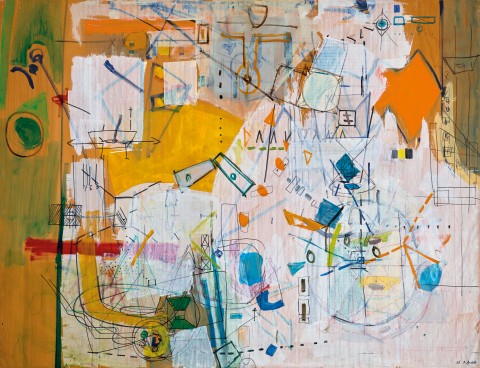ARCHIMEDES' NOTEBOOK, 1968
YVONNE AUDETTE
oil on plywood panel
91.5 x 119.5 cm
signed and dated lower right: 68 y. audette
signed, dated and inscribed with title verso: ARCHIMEDES NOTEBOOK / y. audette / 1968
bears inscription verso: OWNER _ ROBERT KLIPPEL
Robert Klippel, a gift from the artist, 1968
Thence by descent
Private collection, Sydney
Sotheby's, Sydney, 26 August 2003, lot 142
Private collection, Victoria
Yvonne Audette, Bonython Gallery, Sydney, 26 February – March 1968
Yvonne Audette, Holdsworth Galleries, Sydney, 10 – 28 November 1970, cat. 28 (label attached verso)
Heathcote, C., Adams, B., Vaughan, G., & Grant, K., Yvonne Audette: Paintings and Drawings 1949 – 2003, Macmillan, Melbourne, 2003, pl. 123, pp. 160, 193 (illus.), 247
The Theorem, 1967, oil on plywood, 91.0 x 119.0, private collection, Sydney
After first venturing to New York in late 1952 where she enjoyed first-hand exposure to the burgeoning school of Abstract Expressionism through the work of artists including Willem de Kooning, Robert Motherwell and Mark Tobey, Yvonne Audette subsequently travelled to Europe, establishing a studio in Florence in 1955. Against the backdrop of Italy’s rich culture and artistic past, she was welcomed into a community of professional artists (including Arnaldo Pomodoro and Lucio Fontana) who encouraged her and provided an aspirational example. When she eventually returned to her hometown of Sydney in 1966, not surprisingly Audette cut an unusual figure among her largely male local peers. Well-heeled, well-travelled, and well-connected with influential members of the New York Avant Garde, she had matured as a painter and was now working in a subtle and nuanced abstract style derived from the ambiguous mark-making of European Art Informel.
A compelling example of her work from the late-1960s, Archimedes’ Notebook, 1968 embodies the confidence of an artist who had reached creative maturity. Although painted in Sydney, the composition nevertheless maintains her European frame of reference through allusion and style, reflecting the multi-layered histories Audette had encountered in Europe: ‘When I went to Europe in the mid-50s… my work responded to the layering of society itself – the remnants of murals on walls, the frescoes, the whole antiquity of the civilisation.’1 While other paintings from these years bear a similar European resonance – for example Birth of Venus (private collection) offered an abstract homage to the light, colour and spirit of the Italian masters like Botticelli, while her Crossbows at the Battle of Agincourt, 1968 (private collection) featured a montage of half-remembered history paintings – Archimedes' Notebook, however, looked to the past in a different manner. As Dr Bruce Adams elucidates in the first comprehensive monograph on the artist,
‘…with its fine scaffolds of linear graphs just visible beneath the purposeful renderings of unrecognisable objects, this painting [Archimedes’ Notebook] resembled a sheet of technical drawings extracted from some old plan cabinet full of faded blueprints for long-forgotten projects – the archive as a tenuous trace of human thought and activity. Similarly, in The Theorem and The Calculation, both of 1967, the partially obliterated, quasi-mathematical inscriptions recalled ancient almanacs, charts of the stars, and other arcane sources – distant echoes of past systems of knowledge whose meanings were all but lost in the present-day world. The thin, hand-drawn lines also seemed to metamorphose into something biological, becoming as taut as the elongated sinews in an Arshile Gorky composition...
[Furthermore] …the delicate structural frameworks and hints of constructed objects in Archimedes’ Notebook gave the work a certain affinity with Klippel’s fragile metal assemblages, and it is notable that Audette presented the painting to him in gratitude for his support. Curiously, none of Sydney’s reviewers in 1968 explored the subtle parallels between these two co-exhibitors. Though they had devoted themselves to different fields of studio practice, the pair subscribed to similar beliefs about the universal, organic basis to constructed form. Temperamentally, they also had much in common, sharing a private and thoughtful disposition. In their sketchbooks and other studies, the two artists had worked separately for many years on non-figurative experiments in automatism, gesturalism and collage. Their renewed contact in Sydney was thus an opportunity to compare and exchange their respective ideas…’2
1. The artist quoted in McCulloch-Uehlin, S., ‘Abstraction’s Forgotten Generation’, The Australian, 23 April 1999, p. 9
2. Heathcote, C., Adams, B., Vaughan, G., & Grant, K., Yvonne Audette: Paintings and Drawings 1949 – 2003, Macmillan, Melbourne, 2003, p. 160
VERONICA ANGELATOS
